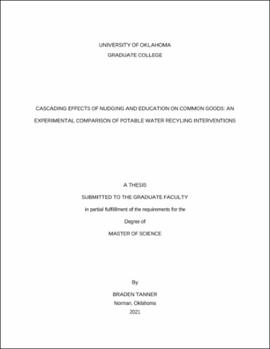| dc.description.abstract | Despite calls for research comparing different forms of choice architecture interventions, little empirical work has directly made those comparisons. Here, I evaluate two strategies on whether they increase acceptance of recycled water on ethically relevant dimensions: libertarian paternalistic default nudges and educational decision aids. Experiment 1 (N = 81) showed that defaults increased shallow acceptance of recycled water (i.e., enrollment in a hypothetical recycled water program). Experiment 2 (N = 142) replicated the effect but also indicated that weak educational interventions (simple infographics) interacted with confidence, such that those who switched from the default had measurably higher confidence in their choice when given the infographic. Experiment 3 (N = 146) suggested that strong educational interventions (educational videos) increased shallow acceptance, increased knowledge of recycled water, and interacted with confidence in the same way observed in Experiment 2. Experiment 4 (N = 332) replicated the shallow acceptance, knowledge, and confidence results from previous experiments, and demonstrated that educational decision aids reliably increased deeper indicators of acceptance (e.g., behavioral intentions, affect, etc.). Ultimately, these results suggest that multiple practical and ethical factors (e.g., strength and mediums of educational interventions, depth of acceptance, potential ethical costs in terms of autonomy and decision confidence) need to be taken into account when deciding to implement these kinds of strategies in ethically defensible ways. | en_US |
